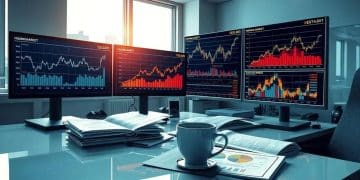Market outlook analysis: Bessent shares insights on trade

Anúncios
The future predictions for global markets highlight the importance of political developments, technological advancements, and economic indicators, which significantly influence investor strategies and market stability.
Market outlook analysis: Bessent weighs in on trade reveals insights into global economics. Curious about how trade impacts your investments? Let’s explore the latest developments.
Anúncios
Understanding the current trade dynamics
Understanding the current trade dynamics is essential for grasping the global economic landscape. With numerous factors at play, it’s crucial to stay informed about how these elements affect trade.
Key Factors Influencing Trade
Several key factors influence trade today. Some of them include:
Anúncios
- Changes in tariffs and trade regulations
- The impact of political relations on agreements
- Technological advancements in logistics
- Economic conditions affecting supply and demand
Trade dynamics are also shaped by external pressures, such as shifts in consumer behavior and product availability. For instance, when a country faces political instability, it may hinder trade operations, leading to significant fluctuations in prices.
Market Reactions and Adaptations
Businesses need to adapt swiftly to changes in the trade environment. This adaptability can be the difference between success and failure. Some strategies include improving supply chains and diversifying markets. Being flexible allows companies to respond to challenges more effectively.
Furthermore, engaging with local markets helps firms to minimize risks. Understanding regional consumer needs is crucial. Companies that can pivot their strategies based on real-time data and trends will likely prosper.
The importance of strong trade relations cannot be overstated. Countries with positive trading partnerships often experience mutual benefits. These relationships can lead to increased exports and better economic stability.
Future Trends in Trade
Looking ahead, the landscape of international trade continues to evolve. Emerging technologies like blockchain and artificial intelligence are reshaping how we think about trade. These technologies enhance transparency and efficiency in transactions.
- Monitoring trade flows more effectively
- Automating processes to reduce costs
- Ensure compliance with regulations
As we move forward, keeping an eye on these trends will be essential. Continuous learning and adaptation will help stakeholders navigate the intricate web of global trade dynamics successfully.
Powell’s influence on monetary policy
Powell’s influence on monetary policy plays a significant role in shaping economic strategies throughout the world. Understanding his approach helps us see how policy changes can affect markets.
The Role of the Federal Reserve
As the Chairman of the Federal Reserve, Powell’s decisions impact the overall monetary policy framework. This includes interest rates, inflation control, and employment levels. His speeches and announcements are closely watched by investors and analysts alike.
- Adjusting interest rates to stimulate or restrain the economy
- Implementing quantitative easing during economic downturns
- Communicating policy intentions to provide market clarity
The Federal Reserve’s role is not just about reacting to economic data. It also involves anticipating future trends. Powell emphasizes the importance of a stable economy to ensure consumer confidence.
The Impact of Statements and Actions
Every statement made by Powell can significantly move markets. For instance, a hint at changing interest rates can lead to fluctuations in stock prices. Investors dissect his language for insights into future actions.
Moreover, Powell’s comments on inflation often stir reactions. If he indicates concern about rising prices, it may prompt market adjustments. Understanding these reactions is crucial for investors.
Another aspect is how Powell navigates political pressures while maintaining the independence of the Federal Reserve. Striking a balance between government expectations and economic realities can often be challenging.
Future Considerations
As the economy continues to evolve, Powell’s strategies may adapt. Factors such as international trade dynamics and domestic economic performance will influence future policies. Watching these interactions will be vital for economic stakeholders.
- Monitoring global economic conditions
- Assessing the impact of domestic policy changes
- Adjusting strategies based on inflation trends
Furthermore, Powell’s focus on long-term economic goals is crucial. By prioritizing sustainable growth, he aims to create stable conditions for all economic participants.
Analyzing the dollar’s strength and weaknesses

Analyzing the dollar’s strength and weaknesses is crucial for understanding its impact on global trade. The value of the dollar influences many aspects of the economy, from pricing imports to determining the competitiveness of U.S. exports.
Factors Affecting the Dollar’s Strength
Several factors play a key role in determining the strength of the dollar. These include:
- Interest rates set by the Federal Reserve
- Economic growth indicators
- Inflation rates
- Political stability and government policies
When the Federal Reserve raises interest rates, it often attracts foreign investment, increasing demand for the dollar. This can lead to a stronger dollar, which impacts trade dynamics.
The Impact of Exchange Rates
The dollar’s strength directly affects exchange rates. A strong dollar can make imports cheaper and exports more expensive. Consequently, this shift can influence the trade balance and domestic industries. For example, consumers may benefit from lower prices on foreign goods.
However, a weaker dollar can boost exports by making U.S. goods more competitively priced in international markets. Businesses that rely heavily on exports may thrive because their products are more affordable to foreign buyers.
Global Economic Relations
The dollar also serves as the world’s primary reserve currency. Many countries hold dollars as part of their foreign exchange reserves. This status gives the U.S. unique advantages but can also lead to vulnerabilities in times of economic uncertainty.
- Increased demand for goods priced in dollars
- Influence on foreign policy and trade relationships
- Potential risks during global financial crises
Monitoring trends in the dollar’s strength can help businesses and investors make informed decisions. Changes in the dollar value can signal shifts in economic health and market conditions.
As global scenarios evolve, keeping an eye on the dollar’s performance will be essential. Investors should always consider the dollar’s potential impact on their investment strategies.
Argentina’s economic challenges and opportunities
Argentina’s economic challenges and opportunities are vital subjects to explore in the context of global market dynamics. The country has seen both struggles and potential for growth, making it an interesting case study for investors and policymakers alike.
Current Economic Landscape
Argentina faces significant economic challenges, including high inflation and currency volatility. These issues impact everyday life and make planning difficult for businesses and consumers. The inflation rate remains one of the highest in the world, eroding purchasing power.
- Yearly inflation rates affecting consumer prices
- Currency devaluation causing uncertainty in the market
- Unemployment levels rising due to economic instability
This economic environment creates a complex landscape. While challenges persist, there are also opportunities for those willing to navigate the risks. Understanding the underlying causes of these issues is essential for developing effective strategies.
Opportunities for Growth
Despite the economic difficulties, Argentina presents several opportunities. The agricultural sector, known for its vast resources, remains a strong pillar. With fertile land, Argentina is a major exporter of soybeans, wheat, and beef, which can drive economic growth.
Additionally, the country has a young population and a growing tech industry. Startups in Buenos Aires are gaining attention, particularly in software and technology services. These industries can significantly contribute to economic diversification and job creation.
Importance of Foreign Investment
Foreign investment plays a crucial role in Argentina’s economic recovery. Attracting international companies can inject much-needed capital and create jobs. However, investors are often cautious due to the country’s economic history and political climate.
- Creating favorable conditions for foreign businesses
- Enhancing local infrastructure to support growth
- Stabilizing the economic environment to boost investor confidence
By fostering a stable and attractive business climate, Argentina can unlock its potential and turn challenges into opportunities for sustainable growth. The right policies and commitment to reform can help the nation navigate its economic journey successfully.
Future predictions for global markets
Future predictions for global markets offer essential insights into what investors can expect in the coming years. Understanding these trends helps in making informed decisions and navigating potential challenges.
Impact of Political Developments
Political events significantly influence market predictions. Changes in leadership and policy reforms can create uncertainty or boost investor confidence. For instance, upcoming elections can lead to shifts in economic policies.
- Trade agreements that impact tariffs
- Stability of political regimes affecting market behavior
- Regulatory changes influencing sectors like technology and energy
As these factors unfold, markets may react quickly, leading to fluctuations in stock prices and foreign investments.
Technological Advancements
Technological innovations continue to transform global markets. Advancements such as artificial intelligence and blockchain are reshaping industries and changing consumer behaviors. Companies that adopt new technologies often gain a competitive edge.
Moreover, the rapid growth of e-commerce has altered retail landscapes, demanding flexibility from traditional businesses. Companies investing in technology will likely be the ones leading the charge in their sectors.
Economic Indicators to Watch
Several economic indicators can serve as predictors for global markets. These include:
- Inflation rates and their impact on purchasing power
- Unemployment data signaling economic health
- GDP growth rates reflecting overall economic performance
Monitoring these indicators helps in understanding market trends. Investors should pay close attention to how they change over time.
Furthermore, global events like pandemics or climate change can create unforeseen challenges. These issues often disrupt supply chains and affect consumer confidence.
Investment Strategies for the Future
As we look forward, effective investment strategies will be crucial. Diversification remains a key approach to minimize risk across different markets. Investors should consider holding a mix of assets to prepare for various market conditions.
Additionally, staying informed and adaptable will allow investors to pivot when necessary. Keeping track of global trends will enhance decision-making and positioning in the market.
In conclusion, understanding global markets requires awareness of various influencing factors. As we’ve explored, political developments, technological advancements, and economic indicators all play vital roles in shaping market predictions. Opportunities and challenges exist, making it critical for investors to stay informed and adaptable. By monitoring these trends, one can strategically navigate the complex world of finance and make sound investment decisions.
Being prepared for changes in the market landscape will not only aid in minimizing risks but can also enhance potential returns. As we look ahead, a proactive approach remains essential.






